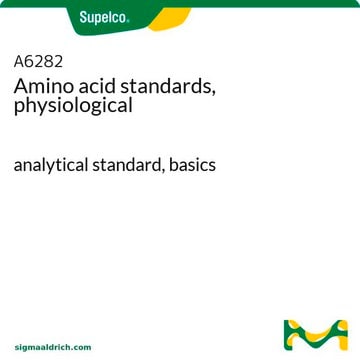S3147
5-Sulfosalicylic acid dihydrate
suitable for electrophoresis, ≥99%
Synonym(s):
2-Hydroxy-5-sulfobenzoic acid
About This Item
Recommended Products
Assay
≥99%
form
powder or crystals
technique(s)
electrophoresis: suitable
impurities
≤0.02% Insoluble matter
≤0.05% Salicylic Acid
mp
105-110 °C (lit.)
solubility
water: soluble 100 mg/mL, clear, colorless
anion traces
chloride (Cl-): ≤0.001%
sulfate (SO42-): ≤0.035%
cation traces
Fe: ≤0.001%
heavy metals (as Pb): ≤0.002%
SMILES string
[H]O[H].[H]O[H].OC(=O)c1cc(ccc1O)S(O)(=O)=O
InChI
1S/C7H6O6S.2H2O/c8-6-2-1-4(14(11,12)13)3-5(6)7(9)10;;/h1-3,8H,(H,9,10)(H,11,12,13);2*1H2
InChI key
BHDKTFQBRFWJKR-UHFFFAOYSA-N
Looking for similar products? Visit Product Comparison Guide
General description
Application
Analysis Note
Signal Word
Danger
Hazard Statements
Precautionary Statements
Hazard Classifications
Eye Dam. 1 - Skin Corr. 1B
Storage Class Code
8A - Combustible corrosive hazardous materials
WGK
WGK 1
Flash Point(F)
Not applicable
Flash Point(C)
Not applicable
Personal Protective Equipment
Certificates of Analysis (COA)
Search for Certificates of Analysis (COA) by entering the products Lot/Batch Number. Lot and Batch Numbers can be found on a product’s label following the words ‘Lot’ or ‘Batch’.
Already Own This Product?
Find documentation for the products that you have recently purchased in the Document Library.
Customers Also Viewed
Our team of scientists has experience in all areas of research including Life Science, Material Science, Chemical Synthesis, Chromatography, Analytical and many others.
Contact Technical Service









